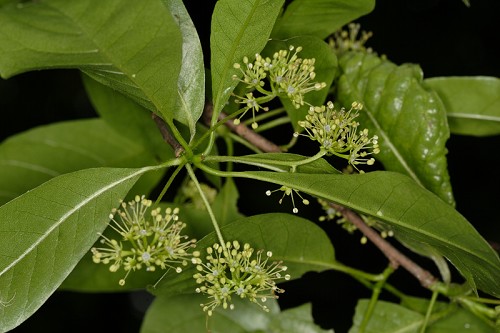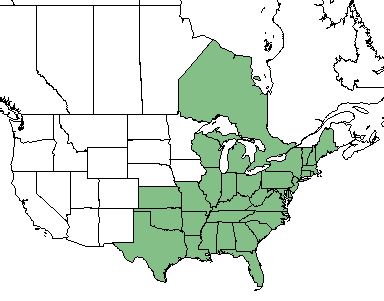Nyssa sylvatica
Common name: blackgum [1], sour gum [2], pepperidge [2]
| Nyssa sylvatica | |
|---|---|

| |
| Photo by John Gwaltney at the Southeasten Flora Database | |
| Scientific classification | |
| Kingdom: | Plantae |
| Division: | Magnoliophyta - Flowering plants |
| Class: | Magnoliopsida - Dicots |
| Order: | Cornales |
| Family: | Cornaceae |
| Genus: | Nyssa |
| Species: | N. sylvatica |
| Binomial name | |
| Nyssa sylvatica Marshall | |

| |
| Natural range of Nyssa sylvatica from USDA NRCS Plants Database. | |
Contents
[hide]Taxonomic Notes
Synonyms: none
Varieties: none
Description
N. sylvatica is a perennial tree of the Cornaceae family native to North America and Canada. [1]
Distribution
N. sylvatica is found in the southeastern corner of the United States from Texas to Maine, as well as the Ontario region of Canada. [1]
Ecology
Habitat
N. sylvatica proliferates in dry or mesic upland forests, less commonly in bottomlands, pine savannas, or upland depressions, where occasionally inundated briefly. [2]
Phenology
N. sylvatica flowers February-May. [3] It is also a relatively shade-tolerant species. [4]
Fire ecology
N. sylvatica is not fire resistant and has low fire tolerance. [1]
Use by animals
N. sylvatica has medium palatability tp browsing animals. [1]
Conservation and Management
Cultivation and restoration
Photo Gallery
References and notes
- ↑ Jump up to: 1.0 1.1 1.2 1.3 1.4 USDA Plant Database https://plants.usda.gov/core/profile?symbol=NYSY
- ↑ Jump up to: 2.0 2.1 2.2 Weakley, A. S. (2015). Flora of the Southern and Mid-Atlantic States. Chapel Hill, NC, University of North Carolina Herbarium.
- Jump up ↑ PanFlora Author: Gil Nelson URL: http://www.gilnelson.com/PanFlora/ Date Accessed: 5/24/18
- Jump up ↑ Albrecht, M. A. and B. C. McCarthy (2006). "Effects of prescribed fire and thinning on tree recruitment patterns in central hardwood forests." Forest Ecology and Management 226(1-3): 88-103.